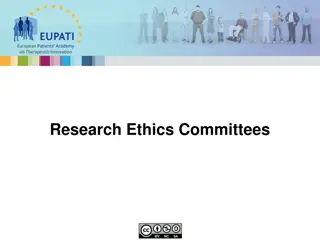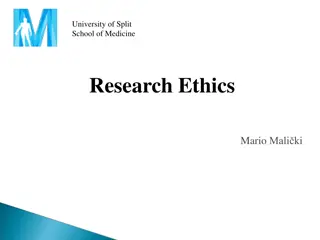
Understanding Research Ethics and Methodology
Explore the fundamental concepts of research ethics, scientific rigor, and differentiating clinical and social science research. Delve into the phases of research from problem identification to data analysis, emphasizing the importance of generalizability and originality in scientific research.
Download Presentation

Please find below an Image/Link to download the presentation.
The content on the website is provided AS IS for your information and personal use only. It may not be sold, licensed, or shared on other websites without obtaining consent from the author. If you encounter any issues during the download, it is possible that the publisher has removed the file from their server.
You are allowed to download the files provided on this website for personal or commercial use, subject to the condition that they are used lawfully. All files are the property of their respective owners.
The content on the website is provided AS IS for your information and personal use only. It may not be sold, licensed, or shared on other websites without obtaining consent from the author.
E N D
Presentation Transcript
IN THE NAME OF THE MOST BENEFICENT THE MOST MERCIFUL ALLAH
RESEARCH ETHICS RESEARCH ETHICS PROF. DR RAB NAWAZ PROF. DR RAB NAWAZ
What is Research? What is ethics?
Generalisability of findings: the extent to which the sample used in the research project reflects the broader population of interest Scientific Rigour (truth is accepted if there is sufficient evidence to support claims made through the research process. Such claims have to withstand the scrutiny of repeated testing) Univesality and objectivity (explicit rules and systematic procedures) - Research should be designed in a manner that allows any competent researcher to conduct a similar study and generate the same findings Key Features of Scientific Research Originality of research work: original ideas backed with appropriate evidence in a clear, logical and convincing argument that illustrates critical and analytical thinking.
DIFFERENCE BETWEEN CLINICAL AND SOCIAL SCIENCE RESEARCH Clinical Research Definition A research study intended to test safety, quality, effectiveness of new and/or existing or old medicines, medical devices and/or treatment options, using human participants Research activities procedures, include surgical intervention, removal of body tissues/ fluids, administration of chemical substances, observation, etc. Phases or steps followed Social Science Research A systematic recording and analysis of data that may lead to generaliseable, principles and theories resulting in prediction and possibly management of behaviour and events in society. Review of literature, review of data, interviews, focus groups, observatations, administration of survey instruments, or tests etc. Iinvasive/non-invasive Four phases More or less eight phases (depend on research questions and design of the study)
PHASES OF RESEARCH: CLINICAL VS SOCIAL CLINICAL TRIALS SOCIAL RESEARCH PHASE 1: Problem identification PHASE2: Problem definition PHASE I: A new drug, vaccine or medical device is tested in a small group of healthy persons for the very first time. The aim is to determine the general safety, the correct dosage and negative effects. PHASE II: Clinical trials the new drug, vaccine or medical device in a larger group (several hundred people) PHASE III : testing to several thousand people PHASE IV: clinical trials done to several thousand people after the new drug, vaccine or medical drug has been registered and licensed for sale PHASE 3: Development of a theoretical framework PHASE 4: Hypothesis formulation or literature review PHASE 5: Research Design PHASE 6: Data collection PHASE 7: Data analysis PHASE 8: Report writing / dissemination of findings
ETHICS DEFINED A discipline dealing with what is proper course of action A branch of philosophy that looks at what is good and what is bad A system of obligation that we have towards others A study of principles guiding the good of the individual within the context of social interactions and the community
Research Ethics therefore are: 1. A code of guidelines on how to conduct scientific research in a morally acceptable way. 2. Principles and standards that help researchers to uphold the value and standards of knowledge construction.
ETHICAL CONSIDERATIONS IN THE RESEARCH PROCESS 1. Conceptualisation and design of the study (scientific merit, identify risks and ways to mitigate the risks) Ethical considerations come into play at six stages of research 2. When participants are recruited (the process of informed consent, right to privacy) 3. During the intervention or measurement procedure to which participants are subjected (management of risk) 4. In the release of results obtained 1. Protection of confidentiality and anonymity 2. After the release of results (ensure that participants and communities involved in the research benefit)
OTHER WAYS AT UNETHICAL RESEARCH CONDUCT Deception (issues of full disclosure) Withholding information about the aim of the study Misleading participants about the risks inherent in participating in the study Lack of objectivity and integrity in the design and conduct of research Not identifying the methodological constraints of the study that determine the validity of the findings Misinterpretation of results Not providing details of theories and methods that might be relevant in the interpretation of research findings
OTHER WAYS AT UNETHICAL RESEARCH CONDUCT Plagiarism Conducting research that does not have a scientific base (ill-formed problem statement) Fabrication or falsification of data Not following the appropriate ascription of authorship to a publication
OTHER WAYS AT UNETHICAL RESEARCH CONDUCT Not respecting the right to privacy Not respecting the right to anonymity and confidentiality Not respecting rights of vulnerable groups Children Mentally handicapped individuals The aged Prisoners Illiterate Those with low social status Not having due consideration for the environment
FUNDAMENTALLY RESEARCH ETHICS ARE: a way of conducting the research project such that the three fundamental principles of research (respect, beneficence and justice) are upheld. Ethical research must conform with the national and international accords
Respect Justice: researchers should not place one group of people at risk solely for the benefit another. Respect for research participants (informed consent) Respect for sponsors of research Risks and benefits should be distributed in an equitable manner when recruiting participancts Respect for communities where participants come from Respect for knowledge and academic community PRINCIPLES OF RESEARCH ETHICS Benefits must be weighed against potential risk that a person might have by participating Research should only be justified if its conduct and result will be of benefit to the participants Beneficence:the researcher is responsible for the mental, physical and social wellbeing of the participant throughout the participation in the study. How the community will benefit should be clear from the research protocol
WHY BE CONCERNED WITH RESEARCH ETHICS? 1. Professional Responsibility 2. To avoid reputational damage 3. Research can be harmful to: Participants To researchers To institutions To research communities 4. To avoid litigation
EVOLUTION OF RESEARCH ETHICS, CODES AND REGULATIONS: INTERNATIONAL LANDSCAPE Guidelines for Human Experimentation (1931)Focus on therapeutic vs nontherapeutic informed consent Berlin Code (1900) Much emphasis on Beneficence and Autonomy Nuremberg Code (1947) Declaration of Helsinki (1964) Council for International Organisations of Medical Science (CIOMS) Guidelines (1982) International Conference on Harmonisation (1990) Belmont Report (1978)
NUREMBERG TRIAL 1947: precursor to Nuremberg Research Ethics Code 23 people were tried (20 doctors and 3 administrators). Seven were sentenced to death by hanging; nine were given prison terms and seven were found not guilty. Source: history.com Editors URL: https://www.history.com/topics/world-war-ii/nuremberg-trials
NUREMBERG CODE The judgement by the war crimes tribunal at Nuremberg Germany, laid down ten standards to which physicians must conform when carrying out experiments on human subjects. Key principles in the Nuremberg Code: Voluntary consent of the human subject capacity to consent, freedom from coercion and an understanding of risks and benefits involved; and freedom to bring the experiment to an end. Minimisation of risk and harm. The science and design of the study must yield fruitful outcomes.
Declaration of Helsinki (1964) The central point in DoH is the principle that the well-being of the participant should take precedence over the interests of science Ten out of the 12 ethics research markers from the Nuremberg Codes were adopted. 1964 Adopted by the World Medical Association Photo credit: http://www.pachd.com/free-images/helsinki/market-square-01.jpg
BELMONT REPORT OUTCOME OF THE TUSKEDEE CASE As a result of the Tuskedee case the National Commission for the Protection of Human Subjects of Biomedical and Behavioural Research was established The report sets forth the principles underlying ethically acceptable conduct of research involving human participants. Report is also the basis for the US Federal Regulations governing research The Belmont report emphasises on the principles of respect, justice, and beneficence.
COUNCIL FOR INTERNATIONAL COUNCIL FOR INTERNATIONAL ORGANISATIONS OF MEDICAL ORGANISATIONS OF MEDICAL SCIENCE (CIOMS) GUIDELINES SCIENCE (CIOMS) GUIDELINES (1982) (1982) CIOMS was established in 1949 by WHO and UNESCO mainly to serve the scientific interests of the biomedical community. In 1982 CIOMS issued the International Ethical Guidelines for Biomedical Research Involving Human Subjects to guide the implementation of the DoH The original document had 15 guidelines and has been revised twice (2002 and 2012) and now has 21 guidelines The topics in CIOMS Guidelines include: o Ethical justification and scientific validity of biomedical research including human subjects o Informed consent o Standards for external review o Research in communities with limited resources
INTERNATIONAL CONFERENCE ON INTERNATIONAL CONFERENCE ON HARMONISATION (ICH) HARMONISATION (ICH) ICH brought together the regulatory authorities and pharmaceutical industry of Europe, Japan and the US in 1990. The key objective of ICH is to harmonise the manner in which medicines and drugs are developed and registered In 1996 the ICH finalized the Guidelines for Good Clinical Practice (GCP) The GCP guidelines are intended to provide standards for ethical and scientific quality for developing, conducting and recording of clinical trials WHO, which has an observer status in the ICH Steering Committee published a Handbook for Good Clinical Research Practice in 2006 to help researchers implement the GCP standards
INFORMED CONSENT A consent given by well informed potential participants about the nature of the research procedure, scientific purpose,and about the risks and benefits of the study. Informed consent is given without subjecting the potential participant to coercion, intimidation or undue influence Participant s understanding of the research aim and objectives must be addressed by laying out the details out in the language the participant understands, in a culturally acceptable way.
STAGES AND PROCESS OF INFORMED CONSENT Stages of informed consent Before the commencement of the study Informed Consent Activities Assessment of the local culture Identification of risks and benefits before and after the study Pilot testing Information is presented with the aid of support material to enhance understand of the research aims and objectives Risks and benefits of the study are presented Understanding is assessed Reinforce key ethical principles Address issues of concern At the beginning of the study During the study
KEY ELEMENTS OF INFORMED CONSENT Description of research aims and objectives Description of potential risks Description of expected benefits Explanation of confidentiality and anonymity of participants Explanation of participants rights including the fact that participation is voluntary Explanation of issues relating to remuneration /compensation for injuries
WHAT MEMBERS OF THE RESEARCH ETHICS COMMITTEE LOOK FOR IN YOUR ETHICS PROPOSAL What they check 1. Respect and Dignity of participants How they check it Appropriate information to participants in a form and language they understand Check that there is a fair and humane way by which consent will be obtained The type and nature of questions that participants will be required to respond to The questions are culturally correct and sensitive to the value systems of the participants The rights of vulnerable persons are protected
WHAT MEMBERS OF THE RESEARCH ETHICS COMMITTEE LOOK FOR IN YOUR ETHICS PROPOSAL What they check 2. Privacy and confidentiality How they check it Check for a declaration that guarantees protection of the participant s privacy and confidentiality Check if proposal has outlined potential harm (psychologically, legally or economically), and measures that will be taken to ameliorate potential risks. Check the direct benefit of the research 3. Favourable balance of benefits and risks
WHAT MEMBERS OF THE RESEARCH ETHICS COMMITTEE LOOK FOR IN YOUR ETHICS PROPOSAL What they check Fair subject and community selection How they check it Research must not exclude a class of people who are likely to benefit from research participation or in whom the results of a specific kind of research are likely to be applied. The sampling plan of the research project must be checked for fair subject selection. A Principal investigator carries the primary responsibility for securing participants safety and well being during the study. Professional competence and sufficient capacity
WHAT MEMBERS OF THE RESEARCH ETHICS COMMITTEE LOOK FOR IN YOUR ETHICS PROPOSAL What they check Coercison, undue pressure and conflict of interest How they check it A researcher must disclose the source and extent of funding to research participants. Commercial affiliations or financial interests at the time of proposing and reporting the research must be disclosed. The researcher should demonstrate an awareness of applicable national and international laws, regulations and codes Research involving minors and vulnerable persons
HOW TO SUBMIT A PROPOSAL FOR ETHICAL CLEARANCE The proposal submitted for ethical approval should demonstrate that each of the following ethical aspects are not only addressed, but are discussed in a logical fashion: 1. Respect and dignity of participants 2. Privacy and confidentiality 3. Balance of benefits and risks 4. Sampling plan fair participant selection 5. Competence and capacity of researcher 6. Protocols and procedures followed in dealing with minors, vulnerable persons (if applicable)






















